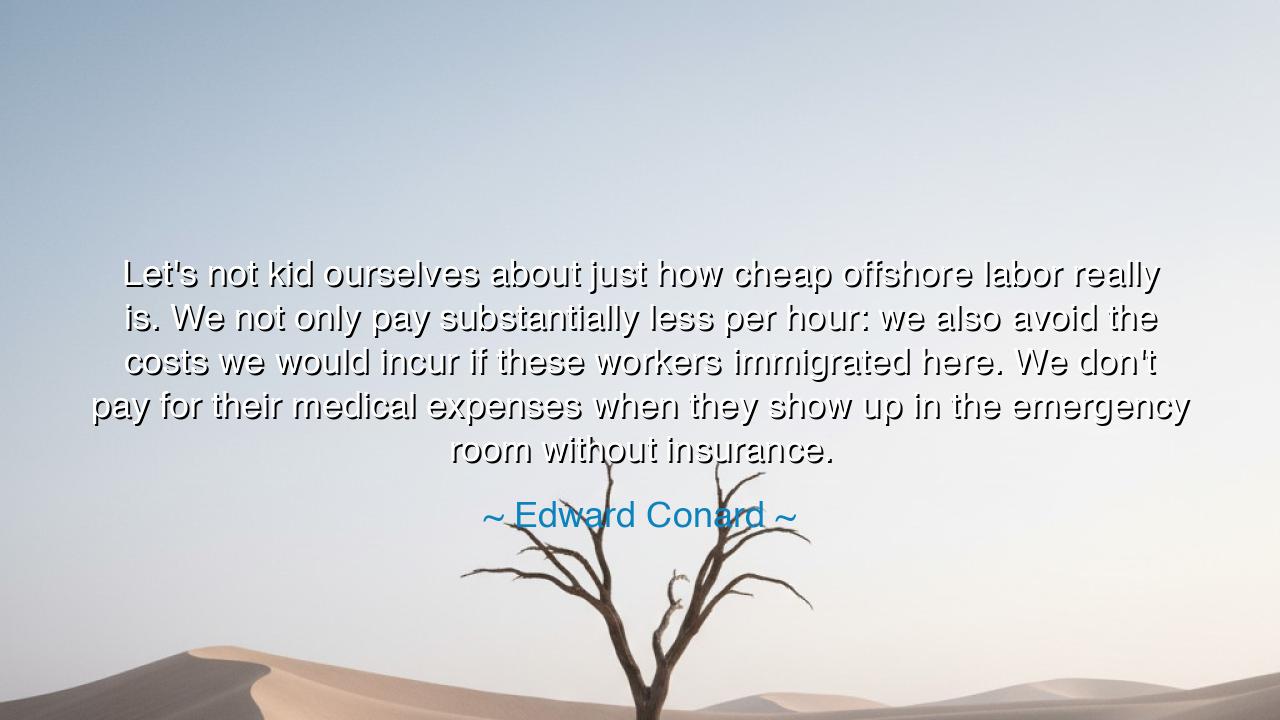
Let's not kid ourselves about just how cheap offshore labor
Let's not kid ourselves about just how cheap offshore labor really is. We not only pay substantially less per hour: we also avoid the costs we would incur if these workers immigrated here. We don't pay for their medical expenses when they show up in the emergency room without insurance.






“Let’s not kid ourselves about just how cheap offshore labor really is. We not only pay substantially less per hour: we also avoid the costs we would incur if these workers immigrated here. We don’t pay for their medical expenses when they show up in the emergency room without insurance.”
Thus spoke Edward Conard, the financier and thinker, whose words pierce through the comforting illusions of modern commerce and expose the moral and economic tension hidden beneath the glitter of globalization. His voice carries the weight of disillusionment — a warning that wealth without responsibility is a hollow prosperity, and that the convenience of cheap labor often conceals the true cost paid by unseen hands in distant lands. In this sentence lies both truth and challenge: that behind every inexpensive good lies a story of unequal burdens, and that the invisible price of comfort is too often borne by those without a voice.
The origin of this quote lies in Conard’s analysis of global economics and trade, a world where businesses seek profit through efficiency and nations compete through labor. In this modern marketplace, offshore labor — the hiring of workers in faraway countries — has become the cornerstone of industry. To the consumer, it means lower prices; to the corporation, higher margins. Yet Conard reminds us that the equation is not so simple. The cheapness of labor is not merely in wages, but in the shifting of social costs — the absence of healthcare, of safety nets, of public responsibility. When a company employs a worker overseas, it benefits not only from lower pay, but from the fact that it does not bear the duties that accompany employment at home — the medical care, the insurance, the protections of law and welfare that are the hallmarks of civilized labor.
In this, Conard unmasks the illusion of moral distance that globalization creates. The modern citizen enjoys the fruits of foreign toil — the clothes, the electronics, the conveniences — yet remains shielded from the sight of the worker’s suffering. The worker’s body is not treated in our hospitals, their families do not attend our schools, their illnesses do not burden our systems. Thus, our wealth appears clean, our consciences untroubled. But as Conard implies, this separation is an economic illusion — for in the grand ledger of humanity, what we save in money, we lose in justice. The cost has not vanished; it has merely been displaced.
This truth echoes through history. Consider the empires of old — Rome, Britain, Spain — each built upon the labor of distant peoples. The Roman citizen lived in comfort while slaves and provincials bore the weight of empire. The British merchant grew rich from the cotton woven by Indian and African hands. In each age, the pattern repeated: wealth concentrated at the center, toil and pain diffused across the periphery. And in each age, the illusion of cheap labor eventually gave way to reckoning — revolts, moral awakenings, or economic collapse. Exploitation, however veiled, carries within it the seeds of its own undoing.
Conard’s mention of medical expenses is not incidental; it is symbolic. Healthcare represents the ultimate form of societal responsibility — the care of one’s fellow being in times of need. To note that offshore workers do not “show up in our emergency rooms” is to expose the cold truth that distance has made us indifferent. Their wounds are not seen; their suffering is not felt. Yet, as the ancients taught, the health of one soul is bound to the health of all. A society that grows wealthy by outsourcing its burdens of care is like a body that amputates a limb to save its own strength — it may survive for a time, but its spirit is diminished.
The lesson of Conard’s words is clear and urgent: that we must look beyond the price tag and see the human ledger behind every product, every transaction, every convenience. The modern world demands not only economic innovation, but moral accounting. The true measure of civilization is not how cheaply it can produce, but how justly it can prosper. To be truly wealthy is not to accumulate at the expense of others, but to uplift those who labor unseen. The wise must therefore ask: how do we honor those who build our world, even when they stand beyond our borders?
So, my listener, let these words serve as both mirror and mandate. Do not kid yourself — there is no such thing as costless comfort. Every bargain has a hidden price, every luxury a silent debt. The way forward is not to abandon trade, but to infuse it with conscience — to create systems where profit and compassion walk side by side. Support fair wages. Demand ethical sourcing. Remember that the invisible worker is part of your world, and their wellbeing, though unseen, sustains your own.
For in the end, Edward Conard’s wisdom reminds us that cheapness without conscience is theft, not of money, but of moral balance. To awaken to this truth is to reclaim the nobility of labor — to recognize that prosperity built on justice endures, while that built on exploitation crumbles. Let us therefore live not as beneficiaries of distance, but as stewards of the whole — understanding that the wealth of one people is bound forever to the dignity of all.






AAdministratorAdministrator
Welcome, honored guests. Please leave a comment, we will respond soon